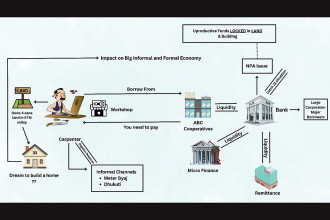
Merchant bankers are licensed institutions which facilitate working of capital market through various activities. During the inception of this concept in Nepal, a majority of the merchant bankers were focused on providing mainly RTA/RTS and issue management services. The scope of work slowly broadened with the introduction of depository participants (DP) related services, portfolio management services and mutual fund operation. Recently, advisory services have become a major domain of work for merchant bankers. Citizen Investment Trust (CIT) is known as a pioneer merchant banker of Nepal. Merchant banking business has evolved over the past few years. It has seen changes in every domain of its work. RTA/RTS, issue management and DP related services have seen major changes due to digitisation in this field. Compulsory dematerialisation of public issues in 2018 changed and prioritised DP business. The introduction of dematerialisation also changed the nature of share registrar business. Merchant bankers now act as Registrar and Transfer Agents (RTA) along with Registrar to Shares (RTS). Similarly, with the introduction of C-ASBA in 2018, issue management business has also seen major changes.
Previously, companies visited merchant bankers for issuance of securities whereas now merchant bankers approach various companies to support them during the issuance of securities to the general public. According to CDS and Clearing Ltd (CDSC), there are 44 registered RTA/RTS service providers and among them NIBL Ace Capital Ltd provides RTA/RTS facility to the largest number of securities in the industry, i.e. 51 securities. Recently, issue management business took a huge leap with the introduction of book building method while issuing the initial public offering (IPO) of Sarbottam Cement Ltd. Global IME Capital Ltd along with Prabhu Capital Ltd and NIBL Ace Capital Ltd acted as the issue managers for this issue. Similarly, in recent times the Nepali capital market has seen a massive increase in the number of demat account holders and meroshare users, which is more than five million and over four million, respectively. Portfolio Management Service(PMS) and Mutual Fund Management Service are two other services being provided by merchant bankers in Nepal. There are two different types of mutual funds in operation in the Nepali capital market, namely close-ended mutual funds and open-ended mutual funds. Siddhartha Investment Growth Fund 1 (SIGS-1) was the first close-ended mutual fund managed by Siddhartha Capital Ltd whereas NIBL Sahabhagita Fund (NIBLSF) was the first open-ended mutual fund managed by NIBL Ace Capital Ltd after the introduction of Mutual Fund Regulation, 2067. Before the New Fund Offering (NFO) of NIBL Sahabhagita Fund (NIBLSF), the mutual fund market of Nepal was fixated in the close-ended funds while open-ended funds were more popular outside Nepal. Systematic Investment Plan (SIP), Dividend Reinvestment Plan (D-Rep) and Systematic Withdrawal Plans (SWP) associated with open-ended fund make them more desirable among investors.
Currently, there are 27 close-ended mutual funds, six matured funds and four open-ended mutual funds with assets under management (AUM) of approximately Rs 32 billion operating in Nepal. Similarly, merchant bankers are currently managing AUM that are more than Rs 7 billion including both discretionary and non-discretionary portfolio. With these two services, merchant bankers of Nepal have been successfully serving their clients with investment banking services as well. Broadening the area of work, merchant bankers these days are focusing on providing advisory services to their clients. Advisory services are the most varied nature of work carried out by merchant bankers that help clients meet their varied business goals. Preparation of business plan, financial restructuring, loan syndication, capital restructuring, feasibility study, debt/equity assessment, corporate restructuring, loan rescheduling/restructuring and company valuation are some of the benefits that businesses can derive by approaching corporate advisory services through merchant bankers.
As mentioned earlier, merchant bankers these days are approaching companies to help them in issue management through its advisory services. Not only large companies, merchant bankers are also helping small and medium enterprises (SMEs) working in debt financing to support and boost their businesses. Corporate advisory service providers are supporting growth of capital market by facilitating issue management and the entire economy by helping in the growth of SMEs at the ground level. The licence of Specialised Investment Fund (SIF) is a way forward for all merchant bankers in Nepal. After obtaining the licence to operate SIF funds from Securities Board of Nepal (SEBON), they can work to develop entrepreneurship in Nepal. Funding is a major challenge for entrepreneurs. Without funding great business ideas have gone obsolete. Entrepreneurs will not only find source of funds but also a link with the experts in their field with the help of merchant bankers. Merchant banking business has been gradually evolving and merchant bankers are continuously looking for and tapping new areas of business. They have not only supported the development of the capital market but also worked for the betterment of the economy. With a few decades of experience and expertise, merchant bankers aim to support their customers in solving any sort of financial difficulties and help in their financial upliftment. READ ALSO:






